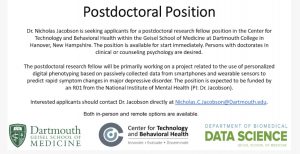We are currently recruiting:
|
Specific Areas of Involvement for Undergraduate Research Assistants
The current lab has many foci concentrating around:
- Developing statistical methods for densely sampled data collection.
- The integration of smartphone-based and wearable data to draw inferences about a person’s mental health status.
- Creating new smartphone applications to assess and treat anxiety, depression, and substance abuse.
Research assistants do not need to be interested in participating in all projects. For example, someone with a major of the psychology and the brain sciences may be interested in that involve digital mental health, but they are not interested in projects that involve any coding/syntax writing. Alternatively, someone in computer science may be more interested in the creation of a digital platform, and they would not be required to have an interest in mental health or statistics.
Concrete practical benefits to undergraduate research assistants:
- Opportunity to learn advanced quantitative skills
- Creation of mentored original work (i.e. potentially being a co-author or first author on journal publication submissions and conference submissions)
- Development of a strong relationship with a faculty member for (1) letters of recommendations, and/or (2) professional references
- Excellent exposure to the following fields: (1) mental health (i.e. psychiatry, clinical psychology), (2) data science (i.e. bioinformatics, statistics, information science), and (3) computer science (i.e. computer engineering).
- Extensions of modern statistical methods. Current smartphone-based and wearable data collection are limited in their ability to draw strong conclusions about the timing of causal processes. In the lab, one of our foci is the creation and validation of new tools, including the timing of naturalistic and causal processes within intensive longitudinal data.
- Recommended interests: statistics (e.g. the major in Mathematical Data Science, though this is certainly not required).
- Specific opportunities: writing statistical software code, conducting Monte Carlo simulation studies, and writing manuscripts
- Digital phenotyping/passive sensing of mental health. In recent years, wearable devices and smartphone sensors have been used to measure constructs related to psychopathology. The current work requires quantitative interests in applying machine learning to smartphone sensor data to determine whether some signals might be fundamentally related to psychopathology processes (e.g. whether we can determine if someone is experiencing an increase in anxiety based on their sleep patterns detected through smartphone accelerometers).
- Specific opportunities: cleaning, organizing, and synthesizing data; literature reviews; coding; manuscript writing
- Developing Apps for Mental Health. Very few persons have access to care for their mental health. A major focus of this lab is creating digital solutions to assess and treat mental health problems. The main mental health problems that we treat are anxiety and depressive disorders, although there are opportunities to develop treatments for other types of mental health problems. These include smartphone-based and web-based applications. To date, we have created applications with more than 50,000 installs, and, consequently, this work can have profound and wide impact on persons daily lives.
- Specific opportunities: writing and altering app code (in Java for Android and/or Swift for iOS); working on the server-side code for data management; creating design prototypes; marketing and promotion of applications; potential opportunities for manuscript writing
Interested students should contact Nick directly (Nicholas.C.Jacobson@dartmouth.edu).
Specific Areas of Involvement for Graduate Students
To be a graduate student, you must first gain admission to a graduate program within Dartmouth College. The lab focuses on problems which are highly interdisciplinary in nature, intersecting psychiatry/clinical psychology, computer science/computer engineering, and data science/statistics. Graduate programs of interest could include, but are not limited to, the following degree programs:
Graduate students in the lab will have the opportunity to choose and build upon their own areas of interest, as long as they align within the broader research areas of the lab. Graduate students will have the opportunity to be trained in paradigms of digital mental health and in the analysis of intensive longitudinal data related to the assessment of mental health in daily life. Graduate students will develop expertise that will prepare them for careers in academia and/or industry.
Graduate students will be expected to both participate in lab projects and develop their own independent areas of study. Graduate students will have the opportunity and be expected to participate fully in the research process, writing and submiting manuscripts, presenting posters or talks at research conferences, and writing graduate student fellowships and/or contributing to preliminary analyses to a full grant proposal. Graduate students will also be expected to mentor undergraduate students.
Graduate students will have access to existing lab data and have the opportunities to collect new original data. Interested students should contact Nick directly (Nicholas.C.Jacobson@dartmouth.edu).
Specific Areas of Involvement for Postdoctoral Scholars
Dr. Jacobson is seeking applicants for a postdoctoral research fellow position in the Center for Technology and Behavioral Health within the Geisel School of Medicine at Dartmouth College in Hanover, New Hampshire. The position start date is flexible, with options to start immediately or in Summer of 2023. Persons with doctorates in clinical psychology, counseling psychology, or psychiatry are desired.
The postdoctoral research fellow will be primarily working on a project related to the use of personalized digital phenotyping based on passively collected data from smartphones and wearable sensors to predict rapid symptom changes in major depressive disorder. The position is funded by the National Institute of Mental Health.

Interested applicants should contact Dr. Jacobson directly at Nicholas.C.Jacobson@Dartmouth.edu.
Alternative funding opportunities may also be possible by applying for post-doctoral grants.
Collaborators
The lab tackles many interdisciplinary problems that are best addressed by team-science approaches, and we welcome the involvement of collaborators within both academia and industry. If you are interested in collaborating with the lab, please contact Nick directly (Nicholas.C.Jacobson@dartmouth.edu).